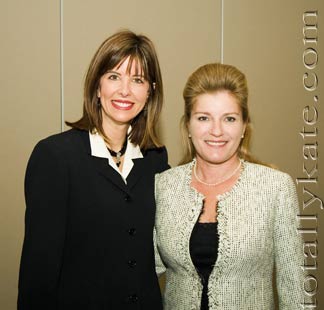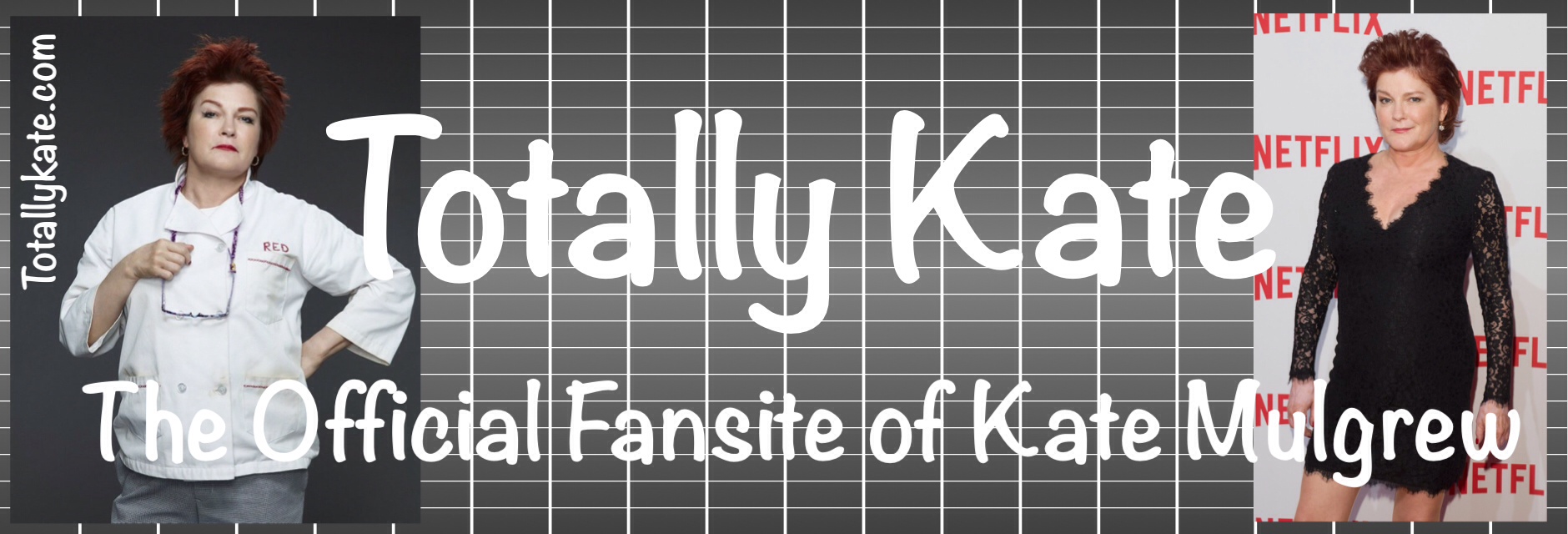
Stephanie Riggs & Kate Mulgrew Photo by John Naschinski |
Interview with Stephanie Riggs
from CBS-4 Denver
November 4, 2005 |

Stephanie Riggs & Kate Mulgrew Photo by John Naschinski |
Interview with Stephanie Riggs
from CBS-4 Denver
November 4, 2005 |
| Stephanie Riggs: You're in good spirits,
considering... have you learned that humor is...
Kate Mulgrew: I'm in good spirits because I've just had a half hour conversation with you. Stephanie Riggs: Well, have you found that humor really is very vital to this human experience? Kate Mulgrew: Balm in Gilead. I mean humor is the only solution to life's miseries. Because as you know, they're multiple. And they're tough. And this disease is horrendous in every single regard. So of course you have to alleviate that by laughter. But it's sinful laughter, because you're laughing at the expense of someone who they themselves can no longer laugh. So the whole thing is a kind of... (Kate laughs). And I'm laughing now, because if I didn't, I'm sure I'd cry. Right? So would everybody else in that room. This is an insidious and unspeakably awful disease, and takes away, before we're ready - far before we're ready - the person who was once the light of our lives. I don't care who that person is. They were once vivid, vital, and everything to you. And now there is nothing but this grotesque vacancy and... it really must stop. Come to an end. We have to fight harder to get this vaccine FDA approved. We have to fill the coffers for research. We must be more ardent and more diligent in the pursuit of this solution. Stephanie Riggs: What has your Mom taught you? Kate Mulgrew: What has my mother taught me? Everything... that has given my life dimension. Meaning. Capacity for love. The understanding that empathy is all we have. A wild, unspeakable love for books and knowledge. Curiosity. And the love of whimsy, which has saved my... (laughs)... you know what - what's left of it. The love of whimsy and the love of folly. She was a genius at saying "so mine are the eccentricities of a nightingale. That makes my nightingale's song prettier." She gave me everything. It's very hard to talk about this. Stephanie Riggs: I know... Kate Mulgrew: It's very, very hard. Stephanie Riggs: There's something about mothers. Kate Mulgrew: She gave me what my father could not give me. And she gave it with such unconditional love and abandon. And not just me, but to her seven other children. An uncommon silver arrow in my life. And that's why I'm here. Stephanie Riggs: Do you think, can I be doing something so I don't have to go through this and I don't have to... I can spare my children? I mean what goes on in your mind when you take the journey... Kate Mulgrew: Well, you hope against hope you're not going to get it, but I can tell you right now that where we stand in this disease - it is an inherited disease ... if you're going to get it, you're going to get it. There's nothing you can do to prevent it. That's the... that's the terrible... the essential terror and terrible aspect of this disease. We get close - science gets perilously close to the truth, and then something happens to negate it. I can do all the things by rote that we're supposed to do. I can be a good girl, can't I? (Laughing) My mother was not a very good girl. She loved her wine. And she loved her fried food. And she loved to dance till dawn and she did everything against the book. We're supposed to eat well, and not smoke, and I suppose we're not supposed to kiss any more. I think the thing to do is to love. The thing to do is to get over yourself. The thing to do is just do something. Do something to help somebody else. To get out of your bleeping self-importance, you know. If Alzheimer's strikes you, you won't know it anyway. What you must do is prepare yourself for the inevitable and unspeakable grief of those who will be left in its wake - namely our children. Yours and mine. Stephanie Riggs: How often did you talk to your mom? When you went through all of the kids... I mean was it the kind of relationship where you would talk to her every day, or once a week and explain... Kate Mulgrew: It was a very close relationship. Stephanie Riggs: Yeah. She guided you and ... what did she say when you got the Star Trek role? Kate Mulgrew: 'Oh, you're kidding! What do they do? Aren't they in space?' She talked like that. My mother was from the east. She always talked like that. 'Oh, sweetheart, what is that?' When I got my first role, which was on a soap opera, she said, "Oh, I just don't think so. Not a soap opera, darling. No, no." I said, "Why not?" She said, "Well I think you should be on stage, it's better." So Star Trek to her was a cartoon. And a source of infinite laughter for the entire household. She loved me best on the stage. She loved the movies. But she came with me wherever I went. She was always on location with me. We were very close. Traveled a lot together. She was always with me when I fell in love, which was her great role in my life. "Oh, I don't think this one... No, I'll take him." "What about Dad?" "Who?!" We had great fun. I miss that. I wish that she could know it... Stephanie Riggs: What did she think of the whole business? I mean what was her take ... Kate Mulgrew: What did she think about the theatre? Stephanie Riggs: Just the whole business of being with you and all these actors and egos and... Kate Mulgrew: She loved it. Stephanie Riggs: She loved it. Kate Mulgrew: She loved it. To her it was ... the normal. I should of course be going into the theatre. She couldn't wait. I was twelve when I told her I wanted to be an actress. "Oh," she said, "We've got to get you through high school," she said, "High school is the biggest mistake that we've yet come up with in this culture, so let's get you out of high school." I said, "How?" She said, "You'll just jump three grades." And I did. You can do it. "Terrible waste of time," she said. "You must go out and into the field by the time you're sixteen." And she was at my side. She was right. I think she understood that if I didn't grab it, I would regret that I didn't. You know she always did outrageous sorts of things. She was not your common clay, my mother. I think my father understood that, which is why he prized her so. And I think when she got Alzheimer's - I was about to say got sick, but you can't really say that - when she got Alzheimer's my father just said, "No. I'm going to beat you to the punch, sugar." And my father died in two weeks. Soup to nuts, two weeks. Never been to a doctor in his life. Diagnosed with cancer, and he was dead two weeks later. But I think that he just couldn't bear the fact that she wasn't there. Looking into those eyes. Endless emptiness. My mother was the source of everything. Everything that had life in it in that household. Yeah. It's hard. And I think the longer you have that person, the more remarkably felt is this absence. I'd give anything... just one more... shot. So live it. Live it is my adjuration to everybody. Take every day. Every moment of every day. Understand how precious it is, and how quickly it goes. And how long and unbearable it is in its going. Stephanie Riggs: When was she... how old was she when she was diagnosed? Kate Mulgrew: She was diagnosed six years ago. I took her. I took her kicking and screaming to the neurologist. And my family did not accept this. My father denied it. Alzheimer's was not a disease of... of any credibility to my father. You got kicked in the head by a horse, or you jumped off a bridge because your business went under, but you don't get Alzheimer's. Certainly not when he's got fifteen years left to live. It's very selfish. So his denial was particularly hard. And I bring this up because I think it happens in many, many families, mostly with the men - and the brothers. Men find it very hard to say, "I'm going to lose my wife, because she will longer have her brain." Because they have for so long been served by the beauty of her brain. So my first thing would be - these lovely women here in this chapter are being very active in this regard - get the family educated. Get the family stabilized. Tell them about this disease so they're prepared. And have a neurologist talk to them. Because if you're left in the melee, as I was, it's... it can be awful. Stephanie Riggs: When was the last time you were with your mother? Kate Mulgrew: I just came from my mother. Just. Couple of days ago. So... Stephanie Riggs: And how often do you see her? How often do you speak to her... Kate Mulgrew: Ah, they asked me this in the car, it sounds awful, doesn't it? About four times a year, maybe five. Stephanie Riggs: Does she even know who you are? Kate Mulgrew: Oh no. So I ask myself, what's the point? I go for the caregiver, who's dear to my heart. She was the nanny to my children. She gave up her whole life to go and take care of my mother. I... I go, because the shell is there. She's breathing. But she's gone. I wish she'd die. Of course they don't die, do they? Which is a greater reason to propel this vaccine forward. It must be stopped. It must be arrested. It must be all together prevented. Because it takes such a long time for them to go. And by the time they're finally dead, the whole family's a fractured mess. So... that's why we're gathered here today - to find ways to help each other through this. Stephanie Riggs: I'm sorry for you and all the families. Because there's nothing like having the rock crumble. Kate Mulgrew: No. No. That's exactly right. Or the sun go away forever. You're sort of in this position of... well it does force you into a ... a mystical point of view. You are forced to ask yourself how do you love this person, and where is their soul. And is the soul remaining within this shell. And so you try to deepen the experience for yourself. But in the end nobody wants to see their mother lying there as if she were alive, when it's very, very clear that she's dead. So we must do everything to find the solution. Stephanie Riggs: Does she remember anything or recognize anyone at this point? Kate Mulgrew: No. |
|
Please do not repost or reproduce. |
|
|
|
Thursday, November 3, 2005 |
|
|
|
|
 |